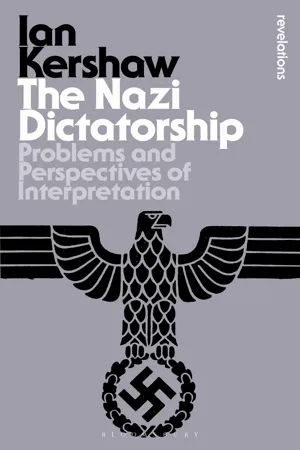
- 320 pages
- English
- PDF
- Available on iOS & Android
About this book
'Unquestionably the most authoritative, balanced, readable, and meticulously documented introduction to the Third Reich.' - International History Review Sir Ian Kershaw is regarded by many as the world's leading authority on Hitler and the Third Reich. Known for his clear and accessible style when dealing with complex historical issues his work has redefined the way we look at this period modern European history. The Nazi Dictatorship is Kershaw's landmark study of the Third Reich. It covers the major themes and debates relating to Nazism including the Holocaust, Hitler's authority and leadership, Nazi Foreign Policy and the aftermath, including issues surrounding Germany's unification. The Revelations edition includes a new preface from the author.
Frequently asked questions
- Essential is ideal for learners and professionals who enjoy exploring a wide range of subjects. Access the Essential Library with 800,000+ trusted titles and best-sellers across business, personal growth, and the humanities. Includes unlimited reading time and Standard Read Aloud voice.
- Complete: Perfect for advanced learners and researchers needing full, unrestricted access. Unlock 1.4M+ books across hundreds of subjects, including academic and specialized titles. The Complete Plan also includes advanced features like Premium Read Aloud and Research Assistant.
Please note we cannot support devices running on iOS 13 and Android 7 or earlier. Learn more about using the app.
Information
Table of contents
- Title Page
- Copyright Page
- Contents
- Preface to the Bloomsbury Revelations edition
- Preface to the Fourth Edition
- Abbreviations
- Chapter 1 Historians and the Problem of Explaining Nazism
- Chapter 2 The Essence of Nazism: form of fascism, brand of totalitarianism, or unique phenomenon?
- Chapter 3 Politics and Economics in the Nazi State
- Chapter 4 Hitler: ‘Master in the Third Reich’ or ‘Weak Dictator’?
- Chapter 5 Hitler and the Holocaust
- Chapter 6 Nazi Foreign Policy: Hitler’s ‘programme’ or ‘expansion without object’?
- Chapter 7 The Third Reich: ‘Social Reaction’ or ‘Social Revolution’?
- Chapter 8 ‘Resistance without the People’?
- Chapter 9 ‘Normality’ and Genocide: The Problem of ‘Historicization’
- Chapter 10 Shifting Perspectives: historiographical trends in the aftermath of unification
- Suggestions for Further Reading
- Index